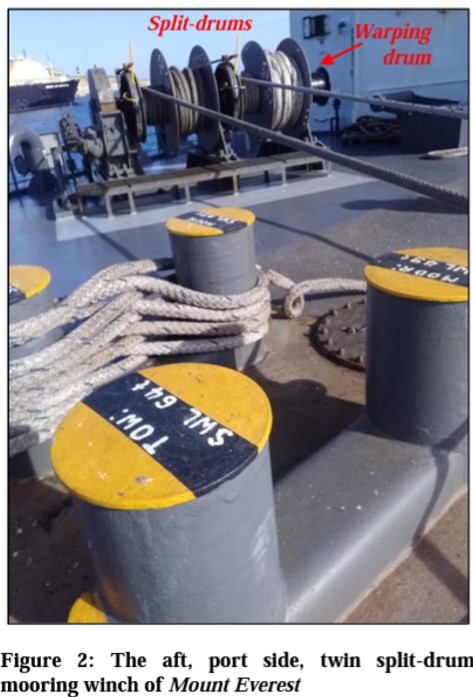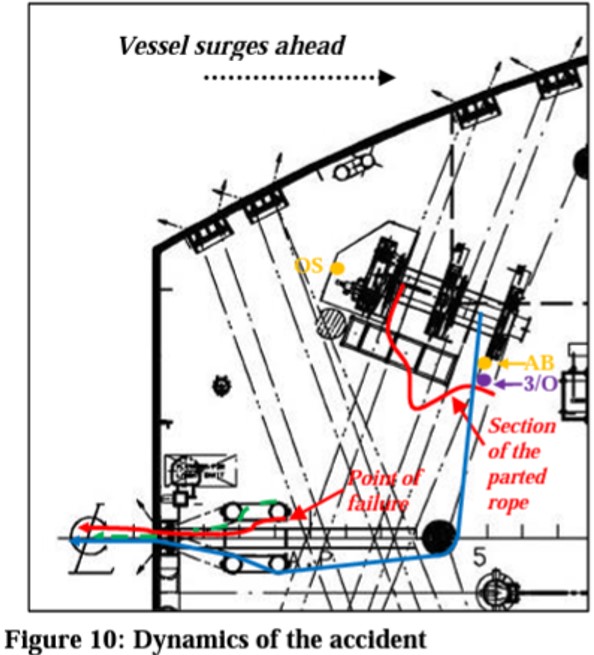Serious injury during mooring operations: rope parted
What happened The Marine Safety Investigation Unit of Transport Malta has published Safety Investigation Report 10/21 into a serious injury which occurred during the mooring of a chemical tanker of 23000 tonnes on Malta. At the aft mooring station, the mooring team noticed that one of the lines was tight, while the other was still slack. Whilst trying to equalize the tension on both lines, the taut line parted and struck the third officer. He suffered serious facial injuries and was transferred to a hospital ashore.


What went right
The crew involved, from the Master down to the ordinary seaman, were properly trained and experienced, and were appropriately rested at the time of the incident. The weather was calm. When the third officer was injured, other crew members took appropriate first response action. The report says that the injured person was “wearing a safety helmet, coveralls, leather gloves and safety shoes, all of which were in good condition.”
What went wrong
- A breaking test of the failed mooring rope, conducted after the accident, revealed that its strength had decreased by more than 50 % of its certified MBL;
- The rope’s external and internal fibres may have deteriorated due to abrasion / friction and / or chemical contamination;
- Stresses induced in the rope, due to internal friction and chaffing during this mooring operation, were contributory factors to this accident.
- The mooring configuration deployed for this operation was not supported by the vessel’s mooring design – it is likely that it would have been difficult to apply, considering the heights and distances between the mooring equipment on the poop deck;
- Crew members’ attention was shifted to another part of the mooring operation;
- There may have been a breakdown in communication during the discussion on the mooring configuration.
What was done to prevent recurrence
- Procedures and risk assessment
- Amendment of procedures to include audit of mooring operations;
- Amendment of generic risk assessment for mooring operations to emphasize clear communication procedures, minimum number of mooring team members required, and the importance of supervision and overview;
- Amended company procedures to ensure that VDR data is also saved following similar accidents.
- Equipment
- Arranged to supply company vessels with better and safer mooring lines with “the latest snapback-arrestor technology”, and introduced a maximum lifetime of 5 years for mooring ropes;
- Arranged to have one rope per ship tested for residual strength on an annual basis;
- People and training
- Conducted additional training for mooring operations fleetwide and also on inspection and maintenance of mooring ropes;
- Introduced minimum crewing requirement for mooring;
- Initiated and performed campaigns on safe mooring operations and introduced a ‘stop work authority’ programme;
Members may wish to refer to:
- Dutch Safety Board: fatality when mooring line snapped
- High potential near-miss: Mooring rope parted
- Mooring line failure resulting in serious injury
- Mooring practice safety guidance for offshore vessels when alongside in ports and harbours (IMCA M 214, IMCA HSSE 029)
- In the line of fire (IMCA HSSE 036, video)
- Mooring incidents (IMCA HSSE 038, video)
Safety Event
Published: 24 October 2022
Download: IMCA SF 23/22
IMCA Safety Flashes
Submit a Report
IMCA Safety Flashes summarise key safety matters and incidents, allowing lessons to be more easily learnt for the benefit of all. The effectiveness of the IMCA Safety Flash system depends on Members sharing information and so avoiding repeat incidents. Please consider adding [email protected] to your internal distribution list for safety alerts or manually submitting information on incidents you consider may be relevant. All information is anonymised or sanitised, as appropriate.
IMCA’s store terms and conditions (https://www.imca-int.com/legal-notices/terms/) apply to all downloads from IMCA’s website, including this document.
IMCA makes every effort to ensure the accuracy and reliability of the data contained in the documents it publishes, but IMCA shall not be liable for any guidance and/or recommendation and/or statement herein contained. The information contained in this document does not fulfil or replace any individual’s or Member's legal, regulatory or other duties or obligations in respect of their operations. Individuals and Members remain solely responsible for the safe, lawful and proper conduct of their operations.
